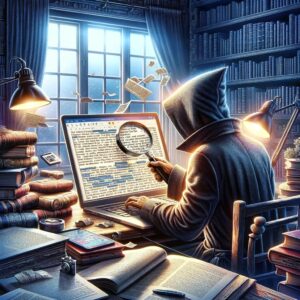Originality is a crucial factor when it comes to academic work. It proves the author’s integrity and demonstrates the effort that goes into a paper.
Plagiarism can appear unintentionally, and that’s why it is imperative to check any assignment for originality before submitting it. But how to do it right? This guide will explore the best plagiarism-checking tools and their features.

Plagiarism in the Spotlight: Why Originality Counts
The main goal of any plagiarism checker is to detect any potential issue so that the author can resolve it. Plagiarism is a severe issue in academia as it undermines all the hard work that goes into a paper. Even if it happens unintentionally, it can result in very severe consequences.
Plagiarism is a complex issue that is often difficult to spot right away. Students and researchers use online sources and might copy something and forget to signify the source. Or the source might not give proper credit, so a student ends up plagiarizing something without knowing it. Even an incorrect citation can be treated as a plagiarism case.
If a work shows signs of plagiarism, it will never receive a high grade. Moreover, students can be subjected to disciplinary punishments in serious situations. Those could be as severe as expulsion.
Using a plagiarism check is necessary in any academic work, whether you are a student, researcher, or professor. Even if you are 100% sure there are no issues, taking precautionary measures is better than taking risks of this sort. After all, originality is a substantial part of one’s academic integrity, and no one wants to endanger that.
That’s why it is essential to know the answer to the question, “What is the best plagiarism checker to use?”.
Decoding the Best: Key Features of Top Plagiarism Checkers
Of course, there is always an option to manually check your paper and read through it several times while checking all citations and sources. Yet, it doesn’t guarantee a complete success. Using an online tool optimizes this process and saves tremendous amounts of time.
So, what is the best free plagiarism checker? It is a multifaceted issue that requires deeper examination. There are plenty of tools out there, both free and paid for. However, figuring out how correct and reliable they are is vital. To do so, one can use crucial effectiveness evaluation criteria, namely:
- Evaluate extent and coverage. A good tool should be able to detect all similarities and find source texts from the database or online. Test it to check how well the tool works and how easily it can see similar sources. Use a heavily plagiarized text and run it through the tool. Examine the report – did the tool detect everything? Did it find all the similar sources? Are the links relevant? (they should not be broken or outdated).
- Citation management. Often, incorrect citations are the core of the problem. Check whether the tool you are looking into manages citations. It should be able to detect incorrect ones. The best ones even offer automatic generation of correct citations.
- Pay attention to privacy. Read through the privacy policies of the checker. It has to align with GDPR and FERPA. It also has to handle private data with respect, like hosting it on a cloud/private repository.
- Try customer support. It is especially crucial if you are considering buying a subscription to a premium plagiarism checker. Reach out to the support team and see how efficient and proactive it is.
- Read reviews on other sources. Customer feedback can give you a better idea of how well the tool works. There might be underlying problems or unexpected benefits you might have missed.
The Leaders of Legitimacy: In-Depth Review of Top Plagiarism Tools
If you do not have time to conduct research on “what is the best free plagiarism checker,” do not worry. We’ve done it for you already.
Please note that all free tools have some limitations compared to premium ones. They are usually less accurate, have a limit of words, or might provide less detailed reports. Yet, they are still practical and helpful. Here are the top free solutions with the best features.
Duplichecker
It is a free and effective tool with a 1,000-word limit for one check. It finds the highest number of sources. It is one of the most accurate free tools. It also doesn’t save texts or sensitive data. Yet, it is not 100% accurate, and the website has plenty of ads.
Search Engine Reports
It is an effective tool directed to copywriters and content creators. It is pretty accurate and allows free checks up to 1,000 words. However, it doesn’t always detect plagiarism from scholarly sources. But it provides three types of reports and features little ads. Yet, it might be slow.
Small SEO Tools
It is a powerful tool with a focus on digital sources. The limit is 1,000 words, and the reports are mostly accurate. The site has ads but doesn’t store documents, and there are multiple upload options.
Plagiarism Detector
It is another efficient site with a 1,000-word limit at a time. It is accurate, but sometimes it can mismatch the source of plagiarism. Yet, it identifies the problem in the text. The reports might seem a bit confusing at first. The site doesn’t store documents.
Plagiarism Checker
It is a well-performing tool with a multitude of languages available. It may mismatch scholarly sources sometimes, yet it accurately detects issues. It features fewer ads than average but has a limit of 800 words per check.
Tailored Detection: Matching Plagiarism Checkers to Your Needs
Not all checkers are the same in their focus and features. Some are more suitable for students; others are helpful for content creators. Let’s define the what is the best plagiarism checker for each user group – students, educators, and content creation professionals.
Top Tools for Students
Duplicheker is the best in terms of accuracy and plagiarism detection. It also is the most effective in finding scholarly sources. It is usable and accurate. There is also a premium subscription available. However, in our research, we only analyzed free functionality.
Search Engine Reports is also helpful for students, although it is less precise with academic sources than Duplichecker. Alternatively, students might use Copyleaks. It is quite accurate and fast in terms of scholarly sources. But it wasn’t featured before because it only allows you to check ten pages for free per month.
Top Tools for Educators
One of the main issues for educators is the word limit. A lengthy document might take several checks because the tools allow 800-1,000 words per time. However, if you check students’ papers or small pieces, Duplicheker, Plagiarism Detector, and Plagiarism Checker are good options.
They are accurate and safe in terms of privacy – none of them saves or stores checked tests. They are great at finding issues but might not always find the source immediately.
Top Tools for Professionals
Content creators and copywriters look for slightly different functions. They do not usually deal with academic sources but rather with websites and other pages. The best free originality checkers for professionals are Small SEO Tools and Search Engine Reports. They are the best at finding digital sources and pages with similarities.
It is not surprising because these programs focus on digital content creation rather than academia. They correctly identify errors and match them with external pages.
Looking Ahead: The Evolving Landscape of Plagiarism Detection
Hopefully, this guide answered your question of “What is the best free plagiarism checker?” so far. Yes, free tools are far from being perfect. They have their limitations, but they are better than none when it comes to academic integrity.
There are also plenty of solutions that claim to be free but are actually not. And there is a varied landscape of paid solutions. As originality is a crucial issue for almost anyone writing regularly and professionally, the niche of checkers will probably evolve and grow.
One of the biggest challenges currently is AI detection. It is safe to say that more tools will also offer checks for AI-generated content. At the same time, more software solutions might use AI algorithms and Natural Language Processing. Adopting these technologies will make it easier to detect plagiarism issues and match them with the relevant sources.
The necessity of using plagiarism-checking software might only increase with time. More sources are available digitally for students, educators, and professionals.



